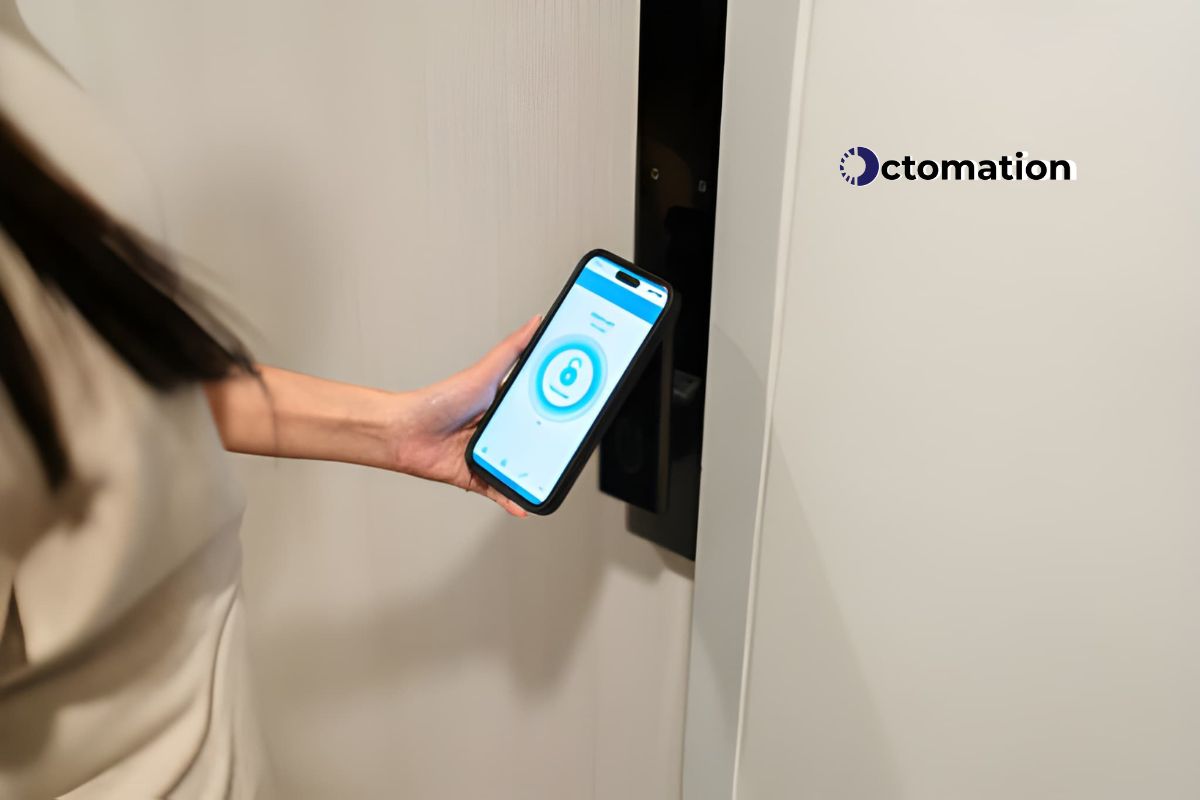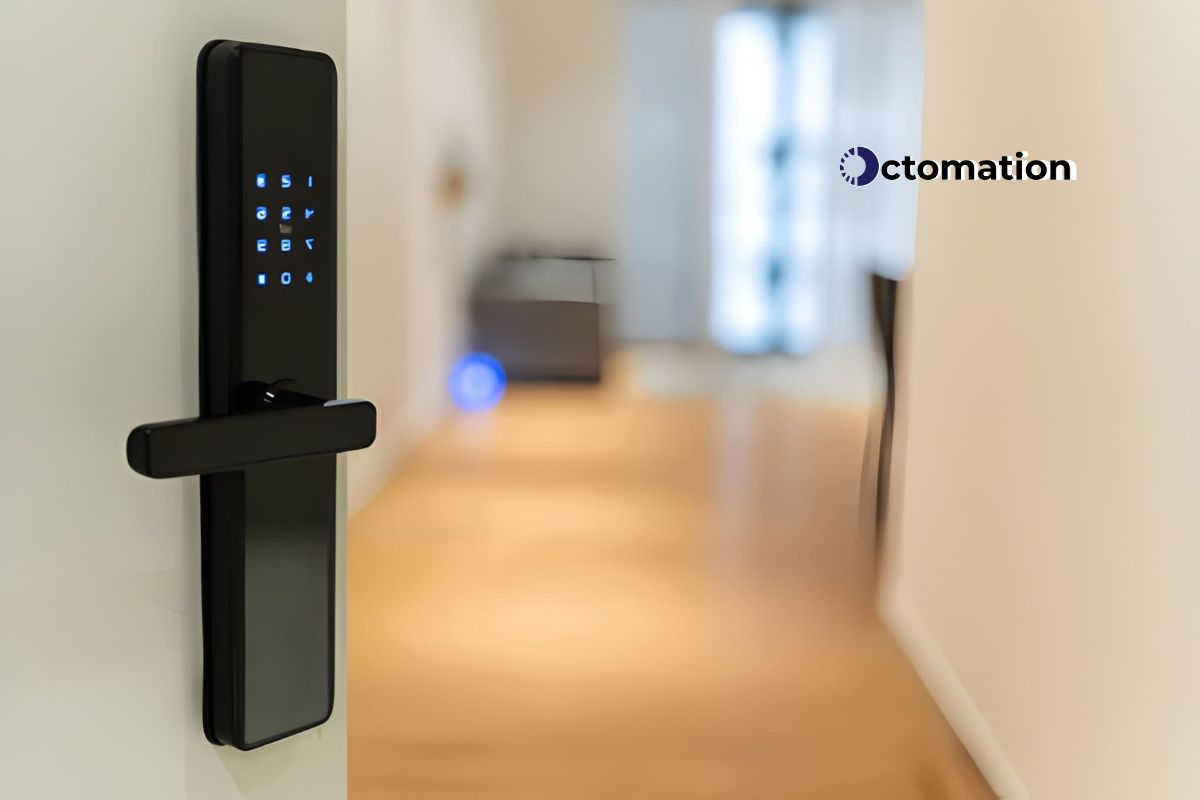Are fingerprint door locks any good?

Home security has advanced in sophistication, speed, and convenience in the modern world. These days, many homeowners wonder if fingerprint door locks are good. Everything you need to know about fingerprint locks will be covered in this blog, including how they operate, how safe they are, their benefits and drawbacks, and if they’re a good fit for your house. Read this guide to find out why more people are using this biometric home automation security systems and if you should follow suit.
Recognizing the Operation of Fingerprint Door Locks
Biometric locks, sometimes referred to as fingerprint door locks, unlock doors using your fingerprint rather than a key. A fingerprint scanner that reads and recognizes your fingerprint is integrated into these locks. The lock opens when your fingerprint is identified and matches the information that has been stored. Should it not match, the door remains locked.
Since fingerprints are unique to each individual, they are almost impossible to duplicate or copy, unlike passwords or keys that can be misplaced or stolen. For this reason, this technology is becoming increasingly common in home security systems, phones, and laptops.
The Reasons Behind the Growing Adoption of Fingerprint Locks
More innovative alternatives replace conventional door locks as smart homes and automation become more prevalent. Fingerprint door locks combine cutting-edge technology with practical ease of use. People are no longer concerned about forgetting their keys or wanting to carry them around all the time. They would rather have a lock that opens with a single touch. This trend is becoming more prevalent in urban areas, where homeowners prioritize modern living and easier security.
The Fingerprint Locks’ Level of Security
Fingerprint locks have digital encryption and are constructed from durable materials like hardened zinc alloy or stainless steel. They are, therefore, resistant to both physical and cyberattacks. To further increase security, some models provide multiple unlocking methods, such as a fingerprint, passcode, mobile app, or emergency key.
Most of these locks can recognize a fingerprint in less than a second, demonstrating their remarkable accuracy. Tricking the system with photos or phony prints is difficult because they use sensors that can read both surface patterns and deeper fingerprint layers.
However, no system is infallible. Certain low-end fingerprint locks may not be as dependable, and environmental factors such as your finger’s moisture, oil, or dirt can occasionally interfere with the scanner. However, with built-in sensors to minimize false readings, contemporary fingerprint locks are now more adept at managing such real-world scenarios.
Is It Practical for Daily Use?
The ease of use of fingerprint door locks is one of the main factors influencing consumer choice. You don’t have to search through pockets or bags for your keys. Walk in and touch the scanner with your finger.
Many models can store multiple fingerprints, allowing your entire family to use the same lock. Without giving a physical key, you can even grant friends, visitors, or service personnel temporary access. Additionally, some systems enable remote control or lock status checks from your smartphone.
Because of their high degree of convenience, these locks are perfect for homes, workplaces, rental properties, and vacation homes.
Durability and Fingerprint Door Lock Lifespan
Fingerprint locks are made to endure frequent use both indoors and outdoors. The majority, particularly those designed for main doors, are dustproof, waterproof, and weatherproof. Their electronic components are typically sealed to guard against moisture and insect damage.

Many people are also worried about battery life, but contemporary locks have energy-efficient designs that can operate on a single set of batteries for six months to a year. In most cases, there is a backup key or USB port for emergency power, and you will also receive notifications when the battery is low.
Fingerprint locks are a wise long-term investment because they can last many years if installed and maintained correctly.
Where in the House They Perform Best
Fingerprint locks are particularly helpful for home offices, main gates, and front doors. They’re also excellent for places like cabinets or safes where you keep valuables. Some even mount them on indoor gates to prevent children from entering or on bedroom doors for added privacy.
If you have a home automation companies delhi, fingerprint locks are simple to integrate with other gadgets, such as smart cameras, lighting automation, or voice assistants like Google Home or Alexa.
Are Families with Older Members or Children Safe Using Them?
Many people are concerned about how easy it will be for elderly family members or children to use fingerprint locks. Thankfully, the majority of systems have intuitive user interfaces. Older adults who have problems remembering passcodes can also find fingerprints more easily than traditional locks, and children can be trained to use them.
However, the system might not always function consistently for young children with still developing fingerprints. Additional access methods, such as keypads or mobile apps, are helpful backups.
Considerations Before Fingerprint Lock Installation
If you’re considering switching to fingerprint technology, purchasing from a reputable company is critical. Seek models with strong materials, weather resistance, multi-layer security features, and positive reviews.
Professional installation is also advised, particularly for main doors. Verify that the lock is compatible with your door frame type and that it fits the thickness of your door. Additionally, see if the system integrates with your home automation setup or provides access through mobile apps.
Although fingerprint locks cost more than standard locks, the extra security and convenience can be worth it, particularly in contemporary homes where smart living is valued.
Are Fingerprint Locks Better Than Conventional Locks?
Your needs will determine the answer. A fingerprint lock is an excellent option if you prefer innovative technology, don’t like carrying keys, and want increased security. It can provide peace of mind, lessen the possibility of misplaced keys, and give you greater control over who enters your house.
However, you should combine fingerprint locks with conventional methods if you live in an area with erratic internet or power or prefer mechanical solutions. Numerous models provide both key-based and biometric entry, enabling this flexibility.
Conclusion: Do Fingerprint Door Locks Make Sense?
In conclusion, smart door locks are pleasing, clever, safe, and incredibly practical. By making entry easier and more controlled, they enhance daily living and give your house a more contemporary look. Although they may be more expensive initially, homeowners wishing to improve their security should invest in them, given the features and peace of mind they provide.